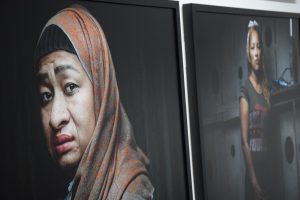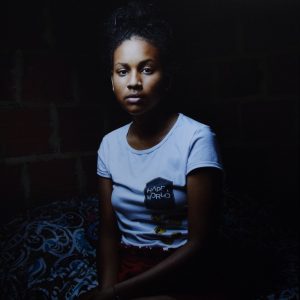Unsung Heroes
Since the beginning of October, the small Galerie Jospeh in the centre of Paris has been holding the exhibition Unsung heroes created by photographer Denis Rouvre and the NGO Médecins du monde, Doctors of the World. The exhibition gathers more than 60 portraits of women from all around the world.
As an international law student, the first thing that interested me was the stories of each woman, what had happened to them and what human rights abuses they had suffered. Some texts were very interesting as they reminded me of testimonies I had to read while doing my internship at the International Criminal Court. Indeed, most rape victims don’t dare to explain what happened to them, they don’t want to use terms like “penis” or “vagina”, they would rather say that the rapist “fell on them”. It was the same here.
After a while, however, I started focusing on the pictures themselves, after all I had also come for the portraits. I realised that the stories were actually as powerful as the pictures. Indeed, the women often pose proudly but one can still sense their pain. The fact that photographer Denis Rouvre manages to grasp their strength and sadness at the same time is quite impressive. Furthermore, nearly all of them look directly into the camera which gives the impression that they are making real eye contact with the viewer. This makes the pictures even more touching.
What I enjoyed about this exhibition is that it approached gender-based violence through different issues: some women talked about rapes committed by soldiers, family members, or employers, others testify about their experience as a maid in another countries. Other subjects such as homophobia, transsexualism, reproductive rights, migration or homelessness were also discussed. I thought that was well-made as it made the viewer realise that gender-based violence can mean a lot of different things.

Picture taken by Alexander Royall
This exhibition seems to come at an interesting time as France is currently debating whether the crime of feminicide, to kill a female because she is a female, should be included in its Criminal code. While on my way to the exhibition I actually walked by one of the numerous feminist tags on the Parisians building which stated “ni una menos” (not one woman less), the slogan used by Argentinian feminist protestors. As the exhibition guides you through different countries such as the Democratic Republic of Congo (DRC), Nepal and Colombia, a few portraits are from French women who criticise France’s legal system which does not seem able to respond to domestic violence. It was therefore a very up to date exhibition.
Finally, it seems interesting to note that a number of Congolese women referred to Doctor Denis Mukwege, the 2018 Nobel Prize winner. This is not surprising as Doctors of the World focus on rights to health such as contraception, abortion and AIDS and Doctor Mukwege, as a gynaecologist and activist, has played an important role in this domain in the DRC but also at the world level. To give an example, Denis Mukwege praised the exhibition saying he hoped it would “raise awareness, especially among men, that the elimination of gender based violence is not only a government and justice’s issue, it has to start at the individual’s level and begins with the awareness-raising and education from a young age”.

Picture taken by Alexander Royall
Sadly, the exhibition moved from Paris to Bordeaux last Friday, so Parisians won’t be able to go see Unsung heroes anymore. However, the good news is that a selection of nine portraits is available on Médecins du monde’s website, so all English, French and Spanish speakers can have an online glimpse of how the exhibition was.
